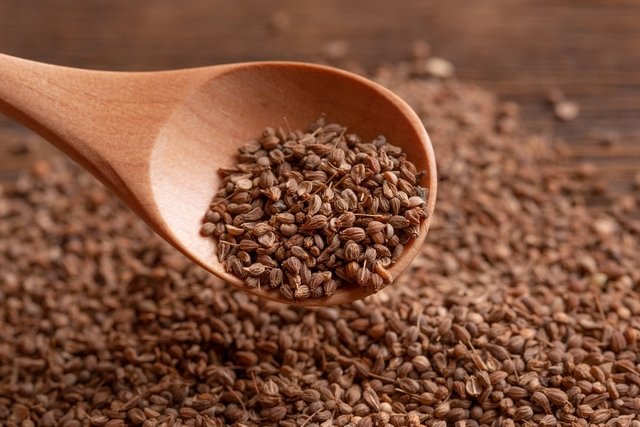Fennel (Pimpinella anisum) is a medicinal plant rich in flavonoids, malic and caffeic acid, which are bioactive compounds with digestive, laxative, carminative and spasmolytic properties, and is therefore recommended for relieving gas, constipation, colic and poor digestion.
Also known as green anise, anise and white pimpernel, fennel is also used to relieve headaches due to its analgesic and anti-inflammatory properties.
The used part of fennel are the seeds, which have a sweet flavor and intense aroma, and can be found in markets, fairs, natural product stores and are used in the form of dry seeds, for preparing teas and culinary recipes, and oil essential, which is used in massages and diffusers.

What is it for
Due to its diverse properties, fennel is normally recommended for:
1. Improve digestion
Fennel contains malic acid, a bioactive compound that reduces stomach acidity, in addition to having digestive and carminative action, improving digestion and helping to combat nausea, gastritis and gastric ulcers. Check out other teas that improve digestion.
In addition, fennel also contains anethole, an aromatic compound that facilitates elimination and prevents the formation of gas, and is therefore used to alleviate discomfort caused by excess gas.
2. Relieve headache
Fennel essential oil contains ursol, eugenol and linalool, compounds with analgesic properties that act on the central nervous system, helping to relieve headaches.
Fennel also contains anethole, a compound that prevents the action of dopamine, a neurotransmitter that is related to migraine attacks, in addition to having anti-inflammatory action, helping to treat migraines.
3. Strengthen the immune system
Fennel contains coumarin, eugenol and linalool, bioactive compounds with antioxidant, antiviral, anti-inflammatory and antibacterial action, which strengthen the immune system, combating bacteria, fungi and viruses, thus helping to treat situations such as cough, flu and sore throat.
4. Fight constipation
Fennel helps combat constipation because it contains anethole, a bioactive compound that improves natural bowel movements, facilitating the elimination of feces. Discover other teas that help combat constipation.
5. Ease cramps
Fennel is a great option for relieving intestinal and menstrual cramps. This is because this plant contains ursol, anethole, eugenol and linalool, which are compounds with analgesic and anti-inflammatory properties.
6. Relieve menopausal symptoms
It is believed that anethole and flavonoids, which are compounds present in fennel, have an estrogenic effect, helping to alleviate menopausal symptoms, such as hot flashes, headaches and difficulty sleeping. See other teas recommended for menopause.
7. Prevent heart disease
Fennel contains coumarin, flavonoids and malic acid, bioactive compounds with antioxidant, anticoagulant and anti-inflammatory actions that improve blood circulation and prevent the formation of clots, preventing diseases such as stroke, thrombosis and heart attack.
8. Help treat seizures
Because it contains flavonoids, malic acid and caffeic acid, which are compounds with antioxidant and anti-inflammatory properties, it is believed that fennel can help treat seizures.
However, more studies are still needed to prove the benefits of fennel in treating seizures.
Difference Between Fennel and Fennel
Fennel and fennel are very similar and can therefore be easily confused. However, despite being different plants, they have similar compounds and properties.
Fennel has the thinnest leaves, yellow flowers and its seeds are more elongated and larger than those of fennel. Learn more about fennel and its benefits.
Fennel is a plant that has white flowers, wide leaves and the seeds are rounder and smaller.
How to use
Fennel can be found in the form of dried seeds, being used to prepare teas and culinary recipes, such as cakes, cookies and salads. Furthermore, fennel can also be used in the form of essential oil, in massages and diffusers.
1. Fennel tea
Fennel tea can be used to relieve headaches and cold and flu symptoms such as cough, runny nose and phlegm. Discover other benefits of fennel tea.
Ingredients:
- 1 teaspoon of dried fennel seeds;
- 1 cup (tea) of water.
Preparation mode:
Crush or chop the fennel seeds. Boil the water and turn off the fire. Transfer the water to a cup and add the fennel seeds. Cover the cup and let it rest for 10 minutes. Strain and drink. You can consume up to 3 cups of this tea per day, for up to 2 weeks in a row.
2. Essential oil
Fennel essential oil is widely used to help relieve menstrual cramps and menopausal symptoms, such as hot flashes, for example.
This oil can also be used as a muscle relaxant and calmer, through massage, and it is generally recommended to dilute 2 drops of fennel essential oil in 1 tablespoon of vegetable oil, such as almond or coconut.
Additionally, to relieve coughs and runny noses, you can place 3 drops of fennel essential oil in a bowl of boiling water and inhale the evaporated air.
Possible side effects
When consumed in excess, fennel can cause symptoms such as nausea, drowsiness, vomiting, allergic respiratory or skin reactions and, in more extreme cases, it can cause muscle paralysis, mental confusion, convulsions and lead to coma.
Contraindications
Fennel is not recommended for children under 12 years of age and people with allergies to anise or the compound anethole. It is also contraindicated for pregnant or breastfeeding women.
Because it has an estrogenic effect, the use of fennel should be avoided by people with hyperestrogenism or by women with breast cancer who are taking hormone replacement therapy.
Furthermore, fennel contains coumarin and is therefore not recommended for people using anticoagulant medications.
Fennel essential oil is contraindicated for people with a history of epilepsy, skin allergies and neurological diseases.

Sign up for our newsletter and stay up to date with exclusive news
that can transform your routine!
Warning: Undefined array key "title" in /home/storelat/public_html/wp-content/plugins/link-whisper-premium/templates/frontend/related-posts.php on line 12
Warning: Undefined array key "title_tag" in /home/storelat/public_html/wp-content/plugins/link-whisper-premium/templates/frontend/related-posts.php on line 13



